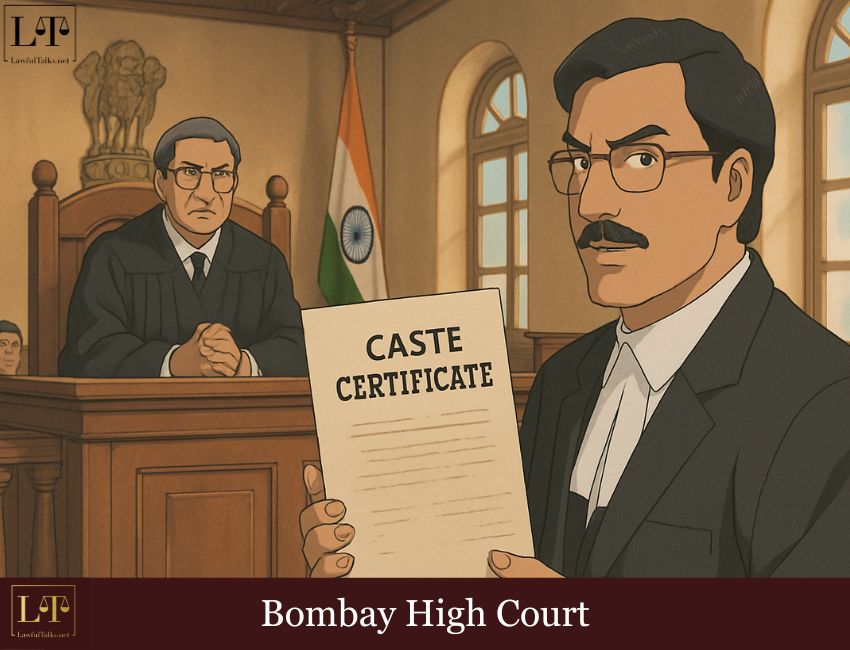Allahabad HC Sets Aside Afzal Ansari's Conviction, Allows Him to Continue as MP

Can Caste Scrutiny Committees suo motu recall their own orders validating caste certificates on grounds of fraud, misrepresentation or suppression of material facts? This legal question has now been referred to a larger bench of the Bombay High Court.

A division bench of Justice Manish Pitale and Justice Y.G. Khobragade noted the divergence in views expressed by different coordinate benches of the court on this issue and opined that the matter needs to be “authoritatively” settled.
Owing to multiple petitions challenging the Scrutiny Committees’ use of inherent powers to cancel caste certificate validity orders, the court deemed it appropriate to refer the matter to a larger bench.
Facts
The petitions before the court arose from an order dated May 15, 2025, passed by the District Caste Scrutiny Committee, which recalled its own earlier validation orders granted to the petitioners.
The Committee reasoned that these certificates were obtained by fraudulent means including suppression of material facts and false representations. The petitioners challenged the recall, arguing that the Committee had no statutory authority under the Maharashtra Scheduled Castes, Scheduled Tribes, De-notified Tribes (Vimukta Jatis), Nomadic Tribes, Other Backward Classes and Special Backward Category (Regulation of Issuance and Verification of) Caste Certificate Act, 2000 (the Act of 2000) to review or recall its own decisions.
They contended that such power of review lies only with the High Court under its constitutional writ jurisdiction.
In the course of hearing the petitions, the division bench took note of prior judgments which have held that Scrutiny Committees do not have any power of substantive review in the absence of such a provision in the statute.
At the same time, the bench also recognised the gravity of situations where certificates are obtained through fraud and observed that a blanket denial of power to the Committee may defeat the purpose of verification.
The bench remarked, “It is held that if a blanket power of recall is bestowed upon the Scrutiny Committee despite the fact that the Act of 2000 does not provide a power of review, there is a possibility of indiscriminate or rampant use of such power, which would destabilize and upset the claims of the individuals belonging to the same family. But, that in itself cannot be the basis to hold that in no circumstances can the Scrutiny Committee exercise its inherent power of recalling its earlier order, which has been obtained on the basis of fraud, misrepresentation or suppression of material facts.”
The court framed key questions and referred them to a larger bench for determination.
1.These include whether the Scrutiny Committee constituted under the Act of 2000 has the power to recall its order on grounds that it is vitiated by fraud, misrepresentation or suppression of material facts;
2. whether the absence of an express review provision in the Act denudes the Committee of inherent power to correct fraudulent orders; if such power exists, what safeguards must be implemented to prevent its abuse;
3. whether seeking leave of the High Court should be mandated under Section 7(2) of the Act; and finally, whether previous decisions in Rakesh Bhimashankar Umbarje vs State of Maharashtra and Bharat Nagu Garud vs State of Maharashtra need to be revisited in this limited context.
The judges observed, “It cannot be countenanced that orders upholding tribe claims and grant of validity certificates obtained on falsehoods, fabrications, fraud, misrepresentation or suppression of material facts, when noticed subsequently, cannot become the basis of reopening such cases.”
They further noted, “It is also relevant to note that the Scrutiny Committee is better equipped to examine the aspects of fraud, fabrication and misrepresentation as it has some powers akin to those of a civil court, as compared to this Court exercising writ jurisdiction under Article 226 of the Constitution of India. The purity of the process, once found to be polluted has to be dealt with and therefore, we find that important questions arise for consideration that need to be authoritatively settled by a larger bench of this Court. Hence, we take recourse to Rule 9(A) of the Bombay High Court Appellate Side Rules, 1960, to formulate questions to be answered by a larger bench in the light of apparent conflict in the aforementioned views of various division benches of this Court.”
Accordingly, the division bench has requested the Chief Justice of the Bombay High Court to constitute a larger bench to decide these important questions of law.
Case Title: Santosh Anil Kolhe vs State of Maharashtra, Writ Petition 8316 of 2025
Advocate for Petitioners: Mr. Pratap V. Jadhavar
Advocate for Respondents: Mr. S. P. Sonpawale and Ms. Saie S. Joshi, AGPs




















































































































































































































































































































































































































































































































































































































































































































































































































